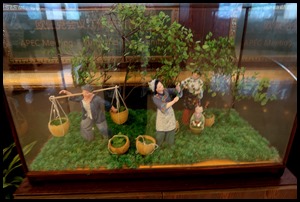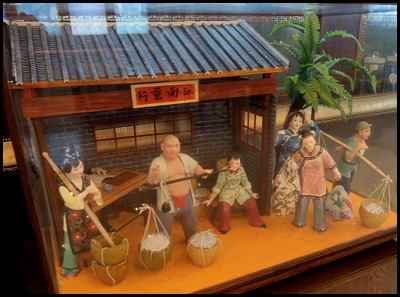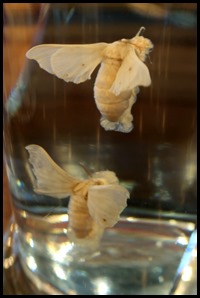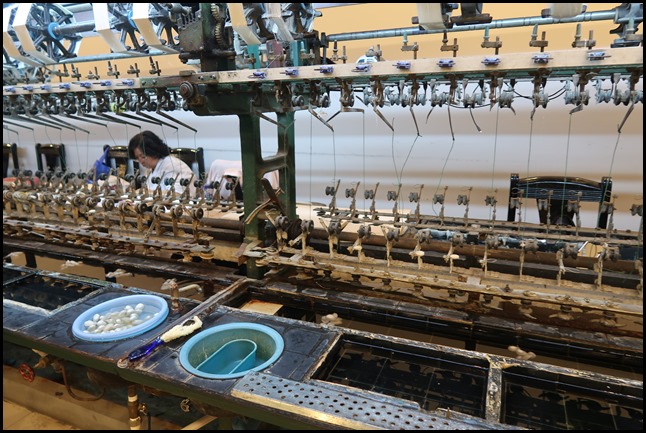Silk Factory Visit

Beez Neez now Chy Whella
Big Bear and Pepe Millard
Tue 22 May 2018 22:47
|
A Visit to a Silk
Factory
 Not far from our digs was this Silk House. As in previous visits to such establishments of
manufacture, I had thought it may just be an exercise in avoiding having to buy
(like Moroccan carpets and leather and countless other such encounters in many
different countries).
       Inside, we were in a huge reception
room that had a delightful series of models in glass
cases showing the production of silk from cocoon to weaving.
 The traditional
woven basket stand used in the business.
 A series of glass
jars showing egg to cocoon.
A testimonial read (typos and all):
Health Care Functions of Natural Silk Fiber. According to overseas reports,
natural silk fiber contains a special element called sericin which has
anti-allergy and skin protection effects. It has been acknowledged by Japanses
bil-chemical circles through years of study that silk quilts made from natural
silk fiber can help improve human health.
1. Promote sleep. Sericin has 18
types of amino-acids which can release micro-element callde hypnosis gene. It
can compose human nerbes and make people sleep soundly. So silk quilts have
magicfunctions of promoting sleep, enhancng vitality and slow down
senescense.
2. It has good thermostatic
control and protection against cold. Silk quilts have the best excellent space
between fiber. It can reduce heat conductivity to keep warm in winter and
exhaust excessive heat when in hot weather.
3, Silk Fiber Properties is
anti-acarid, anti-bacterial and anti-allergy. Sericin in silk material can not
only make human’s skin smooth but also prevent mites and bacterial growth. It is
specifically effective for people of allergic condition.
4. Good MOISTURE absorption
functions. Silk fiber contains affinity lateral chain amino acid in silk protein
on the outer surface. It can effectively absorb moisture in the air and release
it quickly to maintain a dry and comfortable condition inside the quilt. It is
also curative for rheumatism patient. I would have loved to put the
original picture on but as it had a pale blue background with white writing it
was too hard to read even at its biggest.
    Then one of the ladies introduced us
to the jars. Eggs hatch after fourteen
days (the range is ten to twenty-five days depending on
temperature), a few days old, a week old and ten
days.
 We were shown a mulberry leaf covered in ten day
olds.
   Twenty
days, twenty-five days and after a fourth
moult (twenty-two to thirty-three days) the worm will spin its cocoon, change colour and settle as a pupa for ten to fourteen days.
  The silkmoth lives for five to ten days. The silkmoth after
five thousand years of domestication cannot fly. If they are allowed to emerge
produce saliva to ‘dissolve’ a hole through the cocoon making it impossible to
use as it would no longer be a single run of thread. A jar
of cocoons. Each cocoon is made of very fine raw silk
and when unwound would measure anything between three hundred and nine hundred
metres.
   We were then shown in to a room
filled by an enormous machine. Sericulture is the breeding of silkworms for the
production of raw silk. The cocoons are soaked in
water and when ready a lady with lightning quick fingers finds the end of
the silk strand and winds four or five ends together with a swift rub between
thumb and forefinger and does the same to attach it to the end of the length on
its way to the spool. It is her job, all day, to
watch and act as needed, constantly finding ends, joining together and winding
on.
 The
machine made quite a clatter. Silk is
stronger than its equivalent thickness than steel. It takes between two and
three thousand cocoons to produce one pound of silk, so as around seventy
million pounds are produced globally each year, this would mean ten billion
silkworms are ‘sacrificed’. No wonder Mahatma Gandhi was against the trade and
strongly advocated cotton instead. Several Asian
cultures have silkworms in their cuisine and indeed we have seen many pupas
fried on sticks. Of course they are used in Chinese medicine.............but
only worms who have died of a fatal fungal disease.............these are
believed to prevent flatulence, dissolve phlegm and relieve
spasms........
However, silk is used in traditional
medicine, silk sponges in reconstructive surgery where damaged ligaments and
tendons need to heal, also in silk sponge implants are used as a delivery system
for slow-release medicines.
   In a massive room, also the bedding
shop floor we were introduced to a lady in charge of soaking cocoons that hold
two pupas (not twins just as it is). First, she makes a small tear in the end of the cocoon and teases out the silkworms that are put in a dish to be later
thrown out.
  The cocoon is then pulled over a bamboo frame and we watched in amazement as
it was pulled to completely cover the
frame.
  The lady then puts the stretch cocoon
on top of many others on a drying frame. I suppose
Bear trying one on as a hat makes a change from the
trigger finger coming out... It did make the awaiting ladies laugh their heads
off though.
   The awaiting ladies were a team of
four who took a ‘corner’ of cocoon each and stretched it
into a huge square and added it to the growing pile to become a quilt.
Behind the ladies, masses of made quilts ready for sale or shipment. A
king-sized quilt was just over a hundred pounds and a pillow around
twenty.
  The next two areas showcased quilt covers and bedding.
 Through a door in the corner we were
in the shop ‘proper’. I did look for some silver
cushion covers but one side was too plain, the other too garish and they were
around twenty pounds each..... Bales of silk were piled on a couple of tables
for sale by the yard (couldn’t see a price). Men’s shirt were about a hundred
pounds and jackets were in our book silly money. And let’s face it you would
have to be in love with silk to want to clothe yourself in it. I have to admit,
in the past, to having bought Bear a few silk ties, but personally I really
don’t like the feel of it. So after an interesting visit it was time to move
on.
ALL IN ALL MUCH MORE
ENJOYABLE THAN I HAD THOUGHT POSSIBLE
INTERESTING AND WELL
PRESENTED |